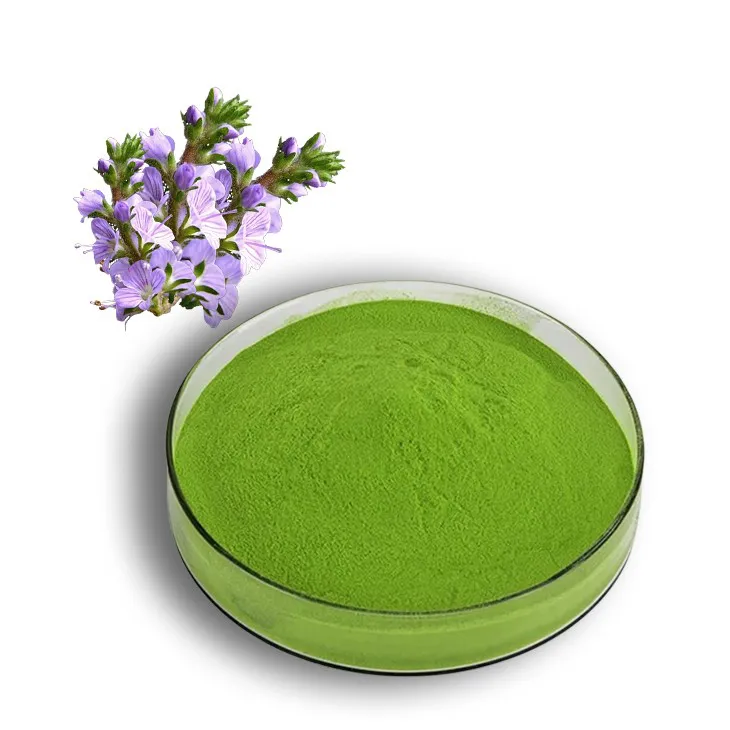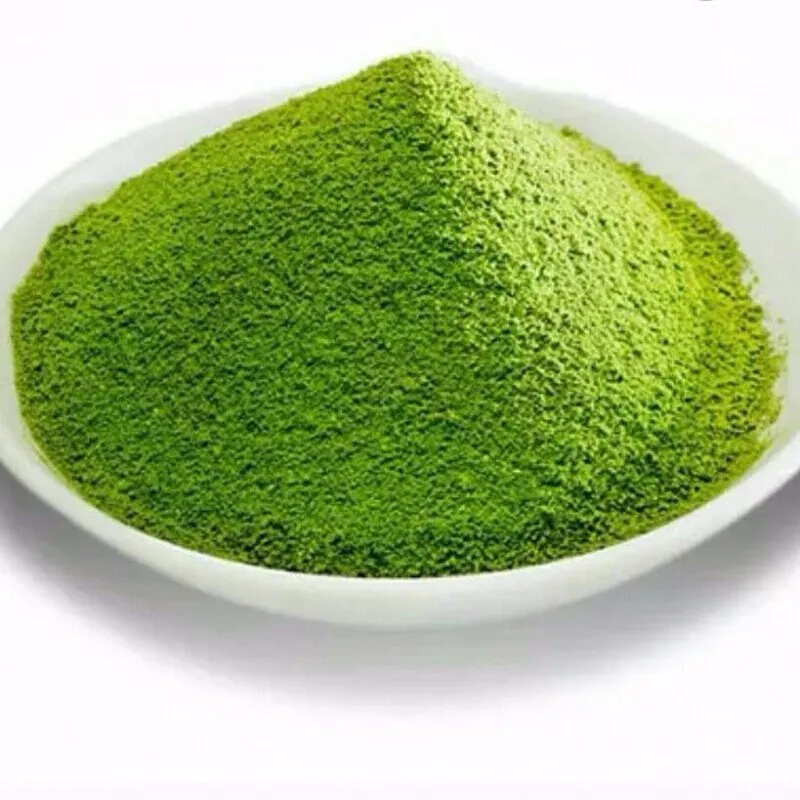- 0086-571-85302990
- sales@greenskybio.com
Chinese alfalfa meal suppliers.
2024-12-01

1. Introduction to Alfalfa Meal in China
Alfalfa Meal has emerged as a significant product in China's agricultural and commercial sectors. China, with its vast agricultural resources, has become a major player in the Alfalfa Meal market. Alfalfa, known scientifically as Medicago sativa, is a highly nutritious plant. When processed into meal form, it retains a plethora of valuable nutrients.
The alfalfa meal is rich in proteins, which are essential for various biological functions. It also contains a wide range of vitamins, such as vitamin A, vitamin C, and various B - vitamins. Additionally, important minerals like calcium, potassium, and phosphorus are present in alfalfa meal. These nutrients make it a valuable commodity, not only in the domestic market but also on the international stage.

2. Role in the Domestic Market
2.1 Livestock Farming
In the domestic livestock farming industry, alfalfa meal is of utmost importance. It serves as a high - quality feed supplement. For example, in dairy farming, cows fed with alfalfa meal tend to produce milk with better nutritional content. The proteins in alfalfa meal help in the growth and development of livestock, improving their overall health and productivity.
Poultry farming also benefits from alfalfa meal. Chickens and other poultry species that consume alfalfa meal - supplemented feed show enhanced egg production and better meat quality. This is due to the balanced nutrition provided by the alfalfa meal, which meets the specific dietary requirements of different livestock animals.
2.2 Food Industry
In the food industry, alfalfa meal has found its place in some health - conscious products. It can be used as an ingredient in certain types of functional foods. For instance, some health bars and dietary supplements incorporate alfalfa meal for its nutritional value.
Alfalfa meal is also being explored for its potential in developing new food products. With the increasing consumer demand for natural and nutritious foods, alfalfa meal offers a viable option for food manufacturers to create innovative products.

3. Standing in the International Market
3.1 Quality and Quantity Assurance
Chinese alfalfa meal suppliers are making a mark in the international market. One of the key factors is their ability to provide large - scale, high - quality products. They have invested in modern agricultural techniques and processing facilities to ensure a consistent supply of high - quality alfalfa meal.
These suppliers adhere to strict quality control standards>. For example, they follow international norms for pesticide residues, ensuring that the alfalfa meal is free from harmful chemicals. This is crucial as different countries have different import requirements regarding food safety.
3.2 Meeting Global Demands
With the growth of the global demand for natural and nutritious products, Chinese alfalfa meal suppliers are well - positioned to expand their market share. As more consumers around the world are becoming health - conscious, the demand for products like alfalfa meal, which is rich in natural nutrients, is on the rise.
Moreover, Chinese suppliers are able to offer competitive prices due to their efficient production processes. This makes their alfalfa meal an attractive option for international buyers, especially in regions where cost - effectiveness is a major consideration.

4. Production and Processing of Alfalfa Meal in China
4.1 Agricultural Practices
In China, alfalfa cultivation involves several key agricultural practices. Farmers select suitable land with good soil fertility and proper drainage. Alfalfa is a hardy plant, but it still requires proper care. Adequate irrigation, especially in arid regions, is essential for its growth.
Fertilization also plays a crucial role. Organic fertilizers are often preferred to maintain the natural quality of the alfalfa. Additionally, pest control measures are implemented to protect the crop from common pests and diseases without relying too much on chemical pesticides.
4.2 Processing Techniques
Once the alfalfa is harvested, it goes through a series of processing steps. The first step is usually drying. This is important to reduce the moisture content and prevent spoilage. Drying can be done using natural sunlight or mechanical drying methods, depending on the scale of production.
After drying, the alfalfa is then ground into meal form. Modern grinding equipment is used to ensure a uniform particle size. Some suppliers may also carry out additional processing steps such as screening to remove any impurities or foreign particles.
5. Challenges Faced by Chinese Alfalfa Meal Suppliers
5.1 Competition from Other Countries
In the international market, Chinese alfalfa meal suppliers face competition from other countries. Some countries with large agricultural sectors, such as the United States and Australia, also produce and export alfalfa meal. These competitors may have their own advantages in terms of production costs, brand recognition, or market access.
For example, the United States has advanced agricultural technology and a large - scale farming system, which can lead to lower production costs in some cases. Australian alfalfa meal may have a certain reputation in some international markets due to its perceived high - quality production.
5.2 Regulatory Requirements
Different countries have different regulatory requirements for importing alfalfa meal. This can pose challenges for Chinese suppliers. They need to keep up with the changing regulations in various export destinations. For instance, some countries may have stricter requirements regarding the presence of certain microorganisms or the maximum allowable levels of specific nutrients.
Meeting these regulatory requirements often involves additional costs for testing and quality control. Suppliers may need to invest in advanced laboratory facilities or collaborate with third - party testing agencies to ensure compliance.
6. Strategies for Future Development
6.1 Innovation in Production and Processing
To stay competitive, Chinese alfalfa meal suppliers can focus on innovation in production and processing. This could involve the development of new cultivation techniques to increase yield and improve quality. For example, the use of precision agriculture technologies such as remote sensing and GPS - guided farming can optimize alfalfa cultivation.
In the processing aspect, new techniques for more efficient drying and grinding can be explored. Additionally, value - added processing, such as the extraction of specific nutrients or bioactive compounds from alfalfa meal, can create new product lines and increase profitability.
6.2 Strengthening International Marketing
Chinese suppliers need to strengthen their international marketing efforts. This includes building strong brand images for their alfalfa meal products. They can participate in international agricultural trade fairs and exhibitions to showcase their products and capabilities.
Establishing long - term partnerships with international buyers and distributors is also crucial. This can help in securing stable export markets and improving market penetration. Additionally, using digital marketing platforms can increase the global visibility of Chinese alfalfa meal products.
7. Conclusion
Chinese alfalfa meal suppliers have made significant progress in both the domestic and international markets. Their products, rich in nutrients, have found important applications in livestock farming and the food industry. However, they also face challenges such as competition from other countries and regulatory requirements.
By implementing strategies such as innovation in production and processing and strengthening international marketing, Chinese alfalfa meal suppliers can continue to grow and expand their market share. As the global demand for natural and nutritious products continues to rise, the future looks promising for these suppliers.
FAQ:
What are the main quality control standards that Chinese alfalfa meal suppliers follow?
Chinese alfalfa meal suppliers follow several key quality control standards. They typically test for nutrient content such as protein levels, vitamin content, and mineral composition. Purity is also important, ensuring there are no contaminants or harmful substances. Additionally, they may adhere to standards regarding moisture content to prevent spoilage during storage and transportation. There are also often regulations about the processing methods to maintain the integrity of the alfalfa meal's nutritional value.
How do Chinese alfalfa meal suppliers ensure the high - quality of their products?
They ensure high - quality products through multiple means. Firstly, they start with high - quality alfalfa sources, often selecting the best - grown alfalfa. During the production process, modern and hygienic processing facilities are used. Quality control checks are carried out at various stages, from raw material inspection to the final product. They also invest in research and development to improve production techniques and maintain consistent quality. Staff training is another aspect, ensuring that employees are aware of quality requirements and handling procedures.
What is the role of Chinese alfalfa meal suppliers in the international market?
In the international market, Chinese alfalfa meal suppliers play a significant role. They are major providers of large - scale, high - quality alfalfa meal. They help meet the global demand for natural and nutritious feed and food ingredients. Their ability to adhere to international quality standards makes their products acceptable in different countries. They also contribute to the international trade balance and help promote the use of alfalfa meal in various industries around the world.
How does alfalfa meal from Chinese suppliers benefit the livestock farming industry?
Alfalfa meal from Chinese suppliers is highly beneficial to the livestock farming industry. It is rich in proteins which are essential for the growth and development of animals. The vitamins and minerals in alfalfa meal also contribute to better animal health, improving their immune systems and overall well - being. As a high - quality feed supplement, it can increase the productivity of livestock, for example, by enhancing milk production in dairy cows or meat quality in livestock.
What are the emerging trends among Chinese alfalfa meal suppliers?
Among Chinese alfalfa meal suppliers, some emerging trends can be observed. There is an increasing focus on sustainable production methods, such as using environmentally friendly farming practices for alfalfa cultivation. Another trend is the development of more specialized alfalfa meal products for different types of livestock or specific market demands. Additionally, suppliers are investing more in digital technology for better supply chain management and quality control, and also for market expansion through e - commerce platforms.
Related literature
- Title: The Quality and Market Potential of Chinese Alfalfa Meal in the Global Feed Industry"
- Title: "Production and Export of Alfalfa Meal from China: Current Situation and Future Prospects"
- Title: "Nutritional Value of Chinese - Sourced Alfalfa Meal for Livestock: A Comprehensive Review"
- ▶ Hesperidin
- ▶ Citrus Bioflavonoids
- ▶ Plant Extract
- ▶ lycopene
- ▶ Diosmin
- ▶ Grape seed extract
- ▶ Sea buckthorn Juice Powder
- ▶ Fruit Juice Powder
- ▶ Hops Extract
- ▶ Artichoke Extract
- ▶ Mushroom extract
- ▶ Astaxanthin
- ▶ Green Tea Extract
- ▶ Curcumin
- ▶ Horse Chestnut Extract
- ▶ Other Product
- ▶ Boswellia Serrata Extract
- ▶ Resveratrol
- ▶ Marigold Extract
- ▶ Grape Leaf Extract
- ▶ New Product
- ▶ Aminolevulinic acid
- ▶ Cranberry Extract
- ▶ Red Yeast Rice
- ▶ Red Wine Extract
-
Panax Ginseng Leaf Extract
2024-12-01
-
Kidney Bean Extract
2024-12-01
-
Coconut Water Powder
2024-12-01
-
Camu Camu Extract
2024-12-01
-
Hericium erinaceus extract powder
2024-12-01
-
Tinospora cordifolia extract
2024-12-01
-
Ginger Extract
2024-12-01
-
Cactus Extract
2024-12-01
-
Grape Leaf Extract
2024-12-01
-
Rose Hip Extract
2024-12-01





















